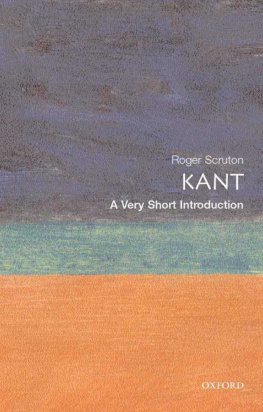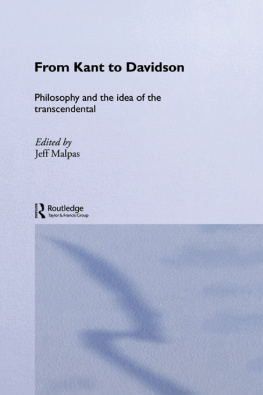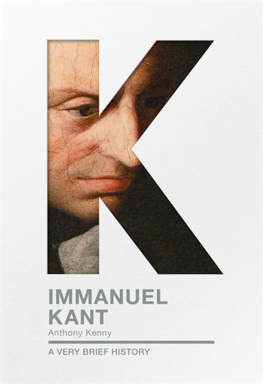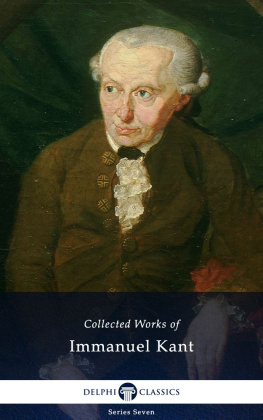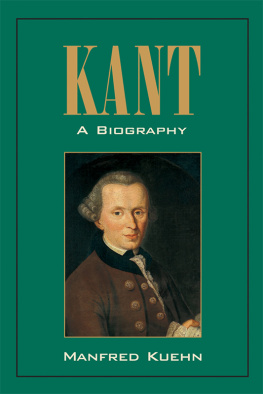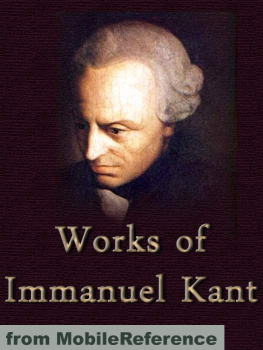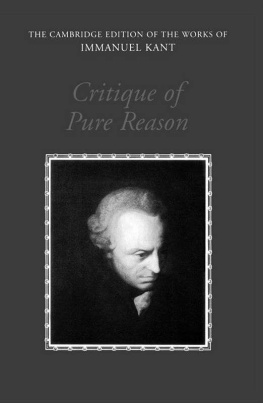Kant Immanuel - The critique of judgement
Here you can read online Kant Immanuel - The critique of judgement full text of the book (entire story) in english for free. Download pdf and epub, get meaning, cover and reviews about this ebook. City: UK;Oxford, year: 2008;2007, publisher: Oxford University Press;Clarendon Press, genre: Science. Description of the work, (preface) as well as reviews are available. Best literature library LitArk.com created for fans of good reading and offers a wide selection of genres:
Romance novel
Science fiction
Adventure
Detective
Science
History
Home and family
Prose
Art
Politics
Computer
Non-fiction
Religion
Business
Children
Humor
Choose a favorite category and find really read worthwhile books. Enjoy immersion in the world of imagination, feel the emotions of the characters or learn something new for yourself, make an fascinating discovery.

- Book:The critique of judgement
- Author:
- Publisher:Oxford University Press;Clarendon Press
- Genre:
- Year:2008;2007
- City:UK;Oxford
- Rating:4 / 5
- Favourites:Add to favourites
- Your mark:
- 80
- 1
- 2
- 3
- 4
- 5
The critique of judgement: summary, description and annotation
We offer to read an annotation, description, summary or preface (depends on what the author of the book "The critique of judgement" wrote himself). If you haven't found the necessary information about the book — write in the comments, we will try to find it.
The critique of judgement — read online for free the complete book (whole text) full work
Below is the text of the book, divided by pages. System saving the place of the last page read, allows you to conveniently read the book "The critique of judgement" online for free, without having to search again every time where you left off. Put a bookmark, and you can go to the page where you finished reading at any time.
Font size:
Interval:
Bookmark:
OXFORD WORLDS CLASSICS
CRITIQUE OF JUDGEMENT
IMMANUEL KANT (17241804) was born in Knigsberg, the capital of Eastern Prussia, and spent his entire life as a writer, teacher, and academic in his home city and its environs. He studied philosophy and the natural sciences at the university between 1740 and 1746. He spent the succeeding years as a house tutor and, subsequently, as a private lecturer, publishing a number of substantial essays and treatises on scientific and philosophical subjects throughout this period. Kant finally became Professor of Logic and Metaphysics at the University of Knigsberg in 1770. Over the next ten years, which Wilhelm Dilthey described as the silent decade, Kant radically revised his earlier ideas and developed an entirely novel conception of the proper method of philosophy, which culminated in his epoch-making Critique of Pure Reason in 1781. He extended his transcendental approach in the Critique of Practical Reason of 1786 and the Critique of Judgement in 1790, the work which Kant himself saw as completing the entire critical enterprise. Throughout the 1790s Kant also produced an abundance of dense contributions to eminently topical questions of ethics, politics, and history, and religion. Kant retired from lecturing in 1796 and died at the beginning of 1804. The Critique of Judgement has proved particularly influential in the continental philosophical tradition and also remains a central point of reference for the contemporary renewal of interest in Kantian thought as a whole.
NICHOLAS WALKER has published articles and essays in the field of German philosophy and literature and has translated texts by Adorno, Habermas, Heidegger, and Gadamer.
OXFORD WORLDS CLASSICS
For over 100 years Oxford Worlds Classics have brought readers closer to the worlds great literature. Now with over 700 titlesfrom the 4,000-year-old myths of Mesopotamia to the twentieth centurys greatest novelsthe series makes available lesser-known as well as celebrated writing.
The pocket-sized hardbacks of the early years contained introductions by Virginia Woolf, T. S. Eliot, Graham Greene, and other literary figures which enriched the experience of reading. Today the series is recognized for its fine scholarship and reliability in texts that span world literature, drama and poetry, religion, philosophy and politics. Each edition includes perceptive commentary and essential background information to meet the changing needs of readers.
Refer to the to navigate through the material in this Oxford Worlds Classics ebook. Use the asterisks (*) throughout the text to access the hyperlinked Explanatory Notes.
OXFORD WORLDS CLASSICS

IMMANUEL KANT

Translated by
JAMES CREED MEREDITH
Revised, edited, and introduced by
NICHOLAS WALKER


Great Clarendon Street, Oxford OX2 6DP
Oxford University Press is a department of the University of Oxford.
It furthers the Universitys objective of excellence in research, scholarship,
and education by publishing worldwide in
Oxford New York
Auckland Cape Town Dar es Salaam Hong Kong Karachi
Kuala Lumpur Madrid Melbourne Mexico City Nairobi
New Delhi Shanghai Taipei Toronto
With offices in
Argentina Austria Brazil Chile Czech Republic France Greece
Guatemala Hungary Italy Japan Poland Portugal Singapore
South Korea Switzerland Thailand Turkey Ukraine Vietnam
Oxford is a registered trade mark of Oxford University Press
in the UK and in certain other countries
Published in the United States
by Oxford University Press Inc., New York
Translation of Critique of Judgement Oxford University Press 1952, 2007
Editorial material and translation of First Introduction Nicholas Walker 2007
The moral rights of the author have been asserted
Database right Oxford University Press (maker)
First published as an Oxford Worlds Classics paperback 2007
All rights reserved. No part of this publication may be reproduced, stored in a retrieval system, or transmitted, in any form or by any means, without the prior permission in writing of Oxford University Press, or as expressly permitted by law, or under terms agreed with the appropriate reprographics rights organization. Enquiries concerning reproduction outside the scope of the above should be sent to the Rights Department, Oxford University Press, at the address above
You must not circulate this book in any other binding or cover
and you must impose this same condition on any acquirer
British Library Cataloguing in Publication Data
Data available
Library of Congress Cataloging in Publication Data
Kant, Immanuel, 17241804.
[Kritik der Urteilskraft. English]
Critique of judgement / Immanuel Kant; translated by James Creed Meredith; revised
and edited by Nicholas Walker.
p. cm.
Includes bibliographical references and index.
ISBN13: 9780192806178 (alk. paper)
1. Judgment (Logic) 2. Judgment (Aesthetics) 3. Teleology. I. Walker, Nicholas. II. Title.
B2783.E5M47 2007
121dc22
2007001270
Typeset by Cepha Imaging Private Ltd., Bangalore, India
Printed in Great Britain
on acid-free paper by
Clays Ltd, St Ives plc
ISBN 9780192806178
1 3 5 7 9 10 8 6 4 2
HEGEL famously claimed, if the student transcripts of his lectures on the history of philosophy are to be believed, that Kant spoke the first rational word concerning the beautiful and had thus made a fundamental, and indeed epochal, contribution to what it was now customary to call aesthetics. But in fact the Critique of Judgement, to which he was specifically alluding, is both more and less than what we would commonly understand by the term aesthetics. And in certain crucial respects the enormous influence which this work in particular exercised upon the first generation of German idealist thinkers who succeeded Kant, and upon nearly all of the most important artistic and literary figures of the period as well, lay almost as much in his philosophical treatment of organic nature as in his interpretation of the realm of aesthetic experience. In order to understand the eventual conjunction or coordination of these apparently rather distinct areas of interest and concern in Kants mature thought, it is helpful to recall in outline something of the development of his philosophy before the publication of the first edition of the Critique of Judgement in 1790.
Although Kant had never been an uncritical or unqualified adherent of the rationalist metaphysical tradition associated with Leibniz, and especially with the historically influential codification of broadly Leibnizian views on the part of philosophers like Christian Wolff or Alexander Gottlieb Baumgarten, this tradition of thought furnished the initial parameters for the development of his own views on the central philosophical issues of the epoch: the precise relationship of reason and the senses in the acquisition of our theoretical knowledge of nature; the ultimate character of the good and the demonstrability of practical, i.e. ethical, principles; the possibility of our knowledge of God by recourse to natural reason and the defence of the essential interests of humanity traditionally associated with such presumed knowledge; the reality of human freedom, the nature of the soul and the hope of immortality; the proper status of judgements concerning matters of beauty and tastein short: the objectivity or otherwise of the claims that had been raised concerning the central questions once addressed by classical metaphysics under the threefold rubric of the true, the good, and the beautiful.
Next pageFont size:
Interval:
Bookmark:
Similar books «The critique of judgement»
Look at similar books to The critique of judgement. We have selected literature similar in name and meaning in the hope of providing readers with more options to find new, interesting, not yet read works.
Discussion, reviews of the book The critique of judgement and just readers' own opinions. Leave your comments, write what you think about the work, its meaning or the main characters. Specify what exactly you liked and what you didn't like, and why you think so.

